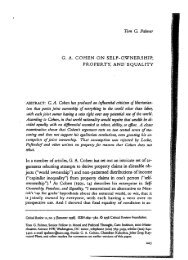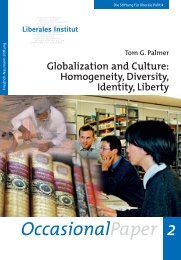Are Patents and Copyrights Morally Justified? - Tom G. Palmer
Are Patents and Copyrights Morally Justified? - Tom G. Palmer
Are Patents and Copyrights Morally Justified? - Tom G. Palmer
You also want an ePaper? Increase the reach of your titles
YUMPU automatically turns print PDFs into web optimized ePapers that Google loves.
harvard Journal of Law ~sYPubiw Policy [Vol. US<br />
means that force can be used against another to stop him from<br />
taking certain steps with his body; enforcement of a property<br />
right in an invention means that force can be used against another<br />
to stop him from using his h<strong>and</strong>s in certain ways, In each<br />
case, an intellectual property right is a claim ofa right over how<br />
another person uses her body.<br />
As the pro-liberty journalist William Leggett, a leader of the<br />
Jacksonian Loco-Foco party <strong>and</strong> editor of the New York Evening<br />
Post, wrote,<br />
We do not wish to deny to British authors a right; but we do<br />
desire that a legal privilege, which we contend has no foundation<br />
in na~turalright, <strong>and</strong> is prejudicial to ‘the greatest<br />
good of the greatest number,’ should be wholly annulled, in<br />
relation to all authors, ofevery name <strong>and</strong> country. Our position<br />
is, that authors have no natural right ofproperty in their<br />
published works, <strong>and</strong> that laws to create <strong>and</strong> guard such a<br />
right are adverse to the true interests of society. 43<br />
Leggett opposed copyright <strong>and</strong> patent rights for two reasons:<br />
First, he argued that intellectual property rights stifled the free<br />
spread of ideas <strong>and</strong> damaged the public interest. 44 Second, he<br />
argued that such rights were in reality statutory monopolies<br />
that infringed upon the rights of others to the ownership of<br />
their own bodies:<br />
Our position that an author has an exclusive natural right of<br />
property in his manuscript, was meant to be understood only<br />
in the same sense that a mechanic has an exclusive natural<br />
right of property in the results of his labour. The mental<br />
process by which he contrived those results are not, <strong>and</strong> cannot<br />
properly be rendered, exclusive property; Since the right<br />
of a free exercise of our thinking faculties is given by nature<br />
to all mankind, <strong>and</strong> the merefact that a given mode ofdoing<br />
43. W. LEOGETF, supra note 2, at 397.98. Interestingly, Leggett <strong>and</strong> Spooner not<br />
only agreed on the abolition of slavery, but also agreed that, if intellectual property<br />
rights are indeed natural rights, then they should not be limited in duration. Accord.<br />
ing to Lessett,<br />
An authoreither has anatural<strong>and</strong>just right ofproperty in his production,<br />
or he has not. Ifhe has, it is one not to be bounded by space, or limited in<br />
duration, but, like that oftheIndian to thebow <strong>and</strong>arrowhe hasshaped from<br />
the sapling <strong>and</strong> reeds of the unappropriated wilderness, his own exclusively<br />
<strong>and</strong> forever.<br />
Id. at 398.<br />
44. Iftheprinciple of copyright were wholly done away, the business of authorship,<br />
we are inclined to think, would readilyaccommodate itselfto the change<br />
ofcircumstances, <strong>and</strong> would be more extensivelypursued, <strong>and</strong> with more advantage<br />
to all concerned than is the case at present.<br />
Id. at 394.











